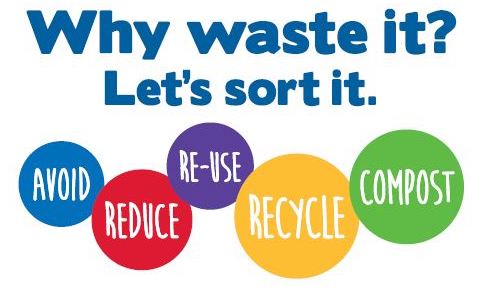
January is the month where the festivities slowly fade out and we engage into routine again, we have new motivation and plans, high energy to start conquering our dreams and everything looks good, however it is also a month with a very high level of waste that was generated by gifts, newly bought things, fireworks…etc. It is the best month to take a moment and think about waste.
“When most of us toss something into the trash, we give it no further thought. We’ve done our part – consume item, dispose of item, move on. Trash is an unpleasant but necessary part of our daily lives, and most of us are happy to end our relationship with a product as soon as it ceases to offer any value.” -roadrunnerwm.com

“Waste” is everything we generate that we dispose of because we consider it useless, there are many different components to waste, organic matter, inorganic matter, biological matter, etc. when everything is thrown together without sorting, all the elements combine and contaminate each other generating hazardous chemicals that affect human health.
Waste in many cases is taken to landfills where it is buried destroying the soil around it, in regions without resources it ends up on the land surface, coast or the ocean without any treatment whatsoever, as this mixed waste decomposes either alone or in a landfill it releases toxic gases into the atmosphere and the water, it becomes a toxic pile that also requires a lot of energy to be processed and worst of all it is mainly composed from elements that while separated they could be recycled and transformed.

We buy things that generate waste- waste goes to landfills, land surfaces or the ocean- contaminated soil, water and air produce a contaminated environment- our bodies eat, drink and breathe contamination- slowly we generate health problems for ourselves such as cancer and other diseases.
How to reduce the damage
When we separate waste, the elements keep their value, the energy that it takes to manage a landfill is reduced and our environment is cleaner, materials that can be re-used and spared from becoming contaminated, as a community we could also save money reducing the amount of waste that goes into the landfill, a lot less plastic would end up in the ocean and in our food chain, our overall health would be increased.
If it’s all mixed up it’s “Trash/Waste” if it’s separated it is value/money.
Quick overview on how to separate

Normally each city has it’s own recycling schedule for pick up, in other cases you take your materials into gathering points.
It might sound like more work than just throwing everything into the bin but separating “Waste” is a really effective way to start healing and avoiding health problems in the future.

Furthermore, with the environmental crisis we are facing nowadays, it won’t be long before governments are forced to implement this system (and more radical measures) on a mandatory basis, so it’s better to get started now.
What are you doing to reduce your waste?
-Cristina G